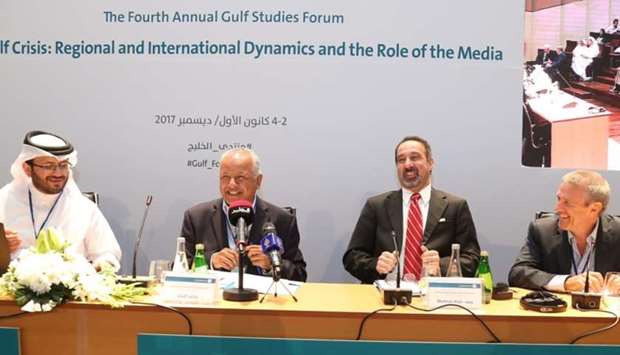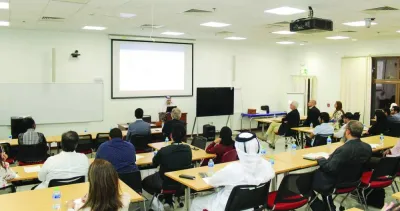Majed al-Ansari, professor of political sociology at Qatar University, made the observation during a panel discussion at the forum.
Participants in the discussion, which had the overarching theme of ‘The Gulf Crisis: Causes, Patterns and Contexts’, stressed that the Gulf crisis was the result of the intersection of long-term patterns in regional and international relations of the Gulf, while the pervasive insecurity among the Gulf countries was largely a product of several interrelated developments.
The session was moderated by Ghanim al-Najjar, professor of political science at Kuwait University. It was held as part of the ongoing fourth annual Gulf Studies Forum organised by the Arab Centre for Research and Policy Studies.
During the panel discussion, al-Ansari spoke on ‘The Blockade of Qatar: Factors and Repercussions’, while Gerd Nonneman, professor of International Relations and Gulf Studies at Georgetown University in Qatar, spoke on ‘The Gulf Crisis in Light of Long-Term Patterns and Recent Changes’; and Mehran Kamrava, professor and director, Centre for International and Regional Studies at Georgetown University’s School of Foreign Service, Qatar, shed light on ‘Chronic Insecurity in the Gulf: Causes and Consequences’.
“They say Qatar is financing terrorists but there is not an iota of truth in it and there is no proof. They say Qatar is close to Iran but in reality, many of the siege countries have closer relations with Iran than Qatar. On an earlier occasion, Qatar even withdrew its envoy to Iran in solidarity with Saudi Arabia,” al-Ansari observed.
“They also raise accusations about Al Jazeera but it all has been proved wrong so far. Saudi Arabia wants to impose its hegemony on Yemen and started its attack on the country," he added
Nonneman noted that the Gulf crisis, in the particular form it has taken, is due to recent shifts at the regional and global levels and also in national decision-making environments.
“One key long-term pattern has been the trend for local rulers to combine the search for a hegemon-protector with that for complimentary relationships to protect themselves from both regional and domestic threats. The creation of GCC reflected both the commonalities and differences in the threat perceptions,” he explained.
According to Kamrava, security threats in the Gulf emanate from two complementary sets of sources. He said, “One set may be broadly labelled as conventional security threats, arising out of actual physical and military challenges to the State. Another set of security threats is from the consequences of perceived threats to the culture and identity.”
He noted that the nature of the prevailing security architecture is flawed and ironically, it perpetuates regional insecurity. The security dilemma, he maintained, is like a vicious cycle in which security-producing efforts by one State results in a sense of insecurity among other States, which then go for their own security-producing measures.

Experts at the panel discussion. PICTURE: Jayan Orma
The blockading countries were not able to prove any of their allegations against Qatar but still continued to level more accusations without any evidence, a speaker at the fourth annual Gulf Studies Forum said on Saturday.



